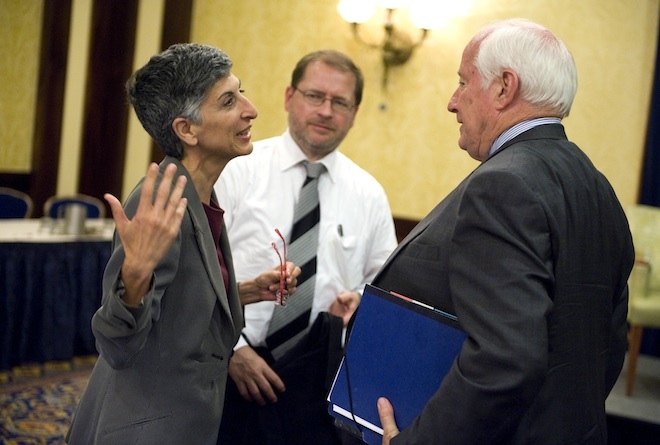Business groups are one of the biggest backers of immigration reform this year, with trade associations in a number of industries looking to expand their pool of legal workers with a new guest worker program. But getting to a deal is easier said than done.
Leaders in low-skill industries like agriculture, meatpacking, construction, landscaping, and hospitality have been agitating for years to pass comprehensive reform, saying they face a shortage of workers without immigration labor. But the biggest labor groups, who are backing immigration reform as well, are suspicious of business’ plans and are trying to head off a guest worker program that they think will be used to undercut American workers with cheap and non-union labor.
“We’re still looking for a sweet spot in the middle of a football field,” Tamar Jacoby, president of ImmigrationWorks USA, an advocacy organization backed by a number of industry groups, told TPM. “There are so many interests to keep happy and to get a bill right is hard.”
President Bush’s own immigration plan ended up trying to split the difference but created major problems for both sides. Businesses objected to amendments that slashed the number of guest worker visas it would make available and the AFL-CIO opposed the final bill in part because it thought the guest worker program still went too far.
This time around, labor organizations like the AFL-CIO and business groups like the Chamber of Commerce both say they’re more committed than ever to reaching a final deal, but the same divisions remain. Labor wants to create an independent commission that would determine whether there are real shortages in various industries and adjust immigration levels accordingly. Jacoby says that would open up the door to more waves of illegal immigration, since foreign workers react too quickly to changes in the U.S. economy to accurately measure. For example, net immigration from Mexico fell rapidly as the United States moved into recession and jobs in construction, restaurants, and hotels became more scarce.
“They knew before we knew that the downturn was coming,” Jacoby said.
Her group hopes backing protections for workers that would allow them to quit their jobs without losing their visas might help reach a compromise. Chamber of Commerce president Tom Donohue, whose group is aligned with ImmigrationWorks USA, said Thursday that he’s been in touch with labor leaders lately in the hopes of keeping a unified front. But if either side drops out during the negotiation process it could give push either pro-labor Democrats or moderate pro-business Republicans to kill a bill. And then there are the more conservative members, most of whom are safe from a Latino vote backlash in ultra-safe seats.
“What everyone realized the last time around was there were Latinos in the streets, and that was very persuasive for progressive Democrats, but for Republicans and centrist Democrats, their phone was ringing off the hook 400 to 1 with people saying ‘build a fence, send them home,'” Jacoby said.
Jacoby worked on the 2007 immigration push as a fellow at the Manhattan Institute and is hoping to use her activist perch this time to rally businesses into taking a more public role selling reform. To help give Republicans cover, ImmigrationWorksUSA is organizing state coalitions of businesses and trade associations to lobby for a comprehensive bill not just in Washington, but in members’ own districts.
“I can’t have a demonstration of businesses on the mall, but we’re talking about op-eds, media presence, people inviting members to come visit their plant or their farm or installation, and some townhall style meetings in the states where members need cover,” she said.
They have some advantages this time. Net immigration from Mexico is near zero in recent years and immigration enforcement spending has shot through the roof, making the popular image of out-of-control borders less compelling than it used to be. Fox News host Bill O’Reilly cited these trends on his show this week to help explain his own recent interest in immigration reform. But this trend cuts both ways: immigration is down in part because of sky high unemployment, making jobs a more emotional topic than they might have been back in 2007 when the labor market was stronger. And if immigrants, legal or otherwise, begin arriving in greater numbers once again to take advantage of a recovering economy it could set up further conflicts down the line.
“The complexity will start when the economy picks up,” Jacoby said.
This post has been updated.









